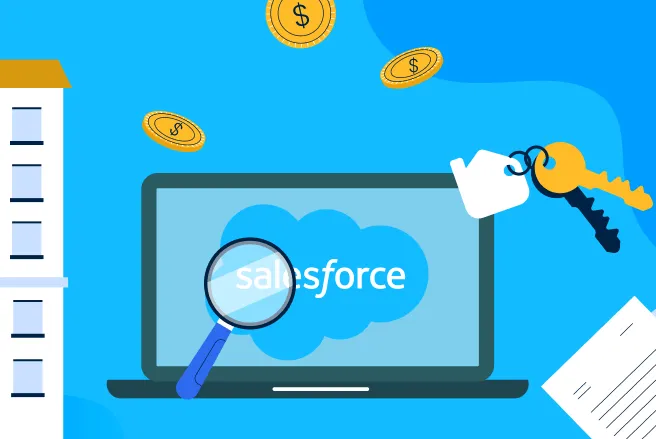
Introduction
Success in real estate demands flexibility. It’s crucial to manage complex situations and grasp intricate concepts. Understanding your clients, knowing precisely who they are and what they desire — is essential. Essentially, you must be readily available for your clients, providing them with the detailed information necessary for potentially the biggest transaction they’ll ever undertake. Cloud-based CRM systems are perfectly designed to support these requirements. Whether it’s residential, commercial, or real estate development, Salesforce real estate solutions offer significant advantages.
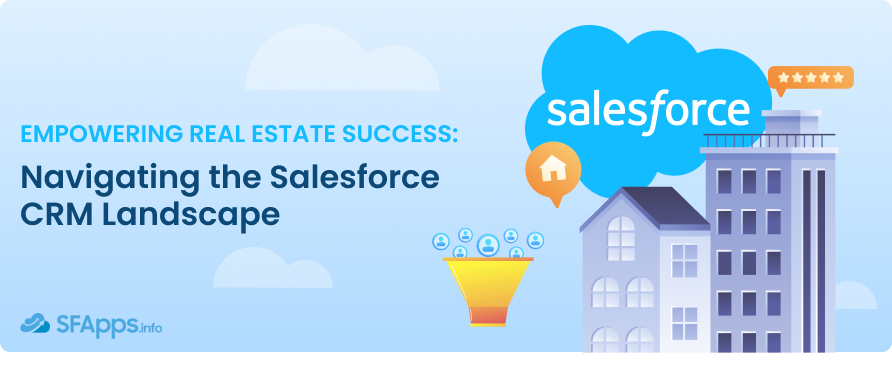
Salesforce isn’t just a software; it’s a game changer for real estate agencies. It helps them stay organized, keep in touch with clients, and manage properties more effectively. As real estate continues to evolve with technology, the need for flexible and powerful solutions like Salesforce Real Estate CRM has never been greater. It offers a wide range of features designed to meet the unique needs of the real estate industry, making it easier for agencies to adapt to new challenges and opportunities.
Insight:
Based on “Why you need a CRM with maintenance scheduling software”, by Salesforce, businesses that have implemented CRM technology for a minimum of two years have experienced a high satisfaction level, with 79% reporting positive outcomes. Remarkably, this satisfaction not only sustains over a decade but also slightly improves, rising to 81% after ten years of continuous use. This trend underscores the enduring value and effectiveness of CRM systems in enhancing operational efficiency and customer relations over the long term.
This guide will walk you through everything you need to know about implementing Salesforce in your real estate business. We’ll cover the advantages, who can benefit the most, the costs involved, and a step-by-step plan for getting started. We aim to arm you with the insights and tools necessary to leverage Salesforce effectively, helping you to grow your business and enhance your client relationships.
In this article we will explore the following topics:
- Overview of Salesforce CRM for Real Estate
- What Real Estate Agencies Can Benefit from Salesforce Integration?
- Types of Specialized Salesforce Services for Real Estate
- Which Salesforce Tools Help Real Estate and How?
- Cost Analysis for Salesforce Real Estate Implementation
- Steps to Implement Salesforce in Real Estate
- Navigating Implementation Challenges: Best Practices for Real Estate
- Enhancing Real Estate with Salesforce Apps and Integrations
- Success Stories: Salesforce Transforming Real Estate
- Frequently Asked Questions: Salesforce in Real Estate
- How does Salesforce specifically benefit real estate businesses?
- Can Salesforce integrate with existing real estate software?
- Is Salesforce suitable for all sizes of real estate businesses?
- What is the average time frame for implementing Salesforce in a real estate business?
- How does Salesforce handle data security, especially with sensitive client information?
- What kind of support can businesses expect after implementing Salesforce?
- How cost-effective is Salesforce for real estate companies?
- Final Thoughts
Overview of Salesforce CRM for Real Estate
Salesforce offers a powerful suite of tools designed to meet the specific needs of the real estate Salesforce sector. Its benefits extend far beyond simple client management, touching every aspect of the business from lead generation to closing deals and beyond. Here, we’ll dive into the key advantages of Salesforce for real estate.
Benefits of Salesforce for Real Estate
- Enhanced Response Times: In real estate, timing can be everything. Clients often operate under tight deadlines and expect prompt answers to their inquiries. Cloud-based CRM systems ensure that you can access and respond to client communications from any device with internet connectivity. This capability ensures that clients receive quick feedback, eliminating the delays of back-and-forth phone calls. For times when immediate responses aren’t possible, CRM systems allow for the creation of personalized automated messages. These messages can inform clients that their inquiry has been received, explain any delays, and provide a timeframe for a follow-up, making them feel acknowledged and informed.
- Streamlined Automation for Detail Management: Selling property involves numerous small yet crucial tasks, from filling out paperwork to managing documents and data retrieval. Automating these tasks through a CRM tool frees up time to concentrate on more significant issues. Automation extends to client relationship management—tracking special dates, sending reminders, or reaching out directly to clients as needed. This level of automation supports a more efficient time management strategy, ensuring minor tasks are handled effectively without detracting from the primary focus of selling properties.
- Unified Data Management: Successful real estate CRM Salesforce professionals draw leads from diverse sources, which can become cumbersome if each source requires a separate database. CRM systems offer a centralized solution for managing all contact and property information, accessible from any location and device. This centralization is especially beneficial when collaborating with a team, ensuring everyone has consistent and updated access to the same information. Integration with industry standards such as IDX, RETS, and MLS databases is crucial, allowing for seamless communication and leveraging the CRM to its fullest potential.
- Facilitated Ongoing Communication: The journey of buying property often results in a meaningful connection between the agent and the client. Maintaining this bond is vital, as satisfied clients are more likely to return for future transactions. However, the gap between purchases can lead to lost contact. CRM tools excel in keeping the lines of communication open through periodic, non-intrusive emails, such as anniversary greetings or holiday messages, reminding clients of your continued availability.
- Real-Time Performance Insights: Investing time and resources into relationship-building is essential in real estate, but not all strategies yield equal results. CRMs provide immediate feedback on the effectiveness of your approaches, allowing for quick adjustments. By analyzing activities and outcomes, you can swiftly move away from less effective tactics and concentrate on strategies that deliver results, optimizing your efforts and resources.
In essence, CRM technology is not just an organizational tool; it’s a comprehensive solution that addresses the multifaceted needs of the real estate sector, from client communication to data management and performance evaluation.
Interesting Real Estate Salesforce Implementation Statistics
Implementing Salesforce for commercial real estate has led to measurable improvements for real estate businesses. For instance, agencies have reported a significant increase in lead conversion rates, a reduction in sales cycles, and improved client retention. Based on “Why you need a CRM with maintenance scheduling software”, by Salesforce, currently, most CRM platforms are cloud-based, making it simpler and more effective for businesses to automate sales processes and improve customer interactions. This shift has yielded positive results, with 80% of businesses seeing a rise in lead generation and 77% experiencing improved conversion rates after implementing CRM systems. As technology advances, it’s not only making tasks easier but also helping to reduce costs.
What Real Estate Agencies Can Benefit from Salesforce Integration?
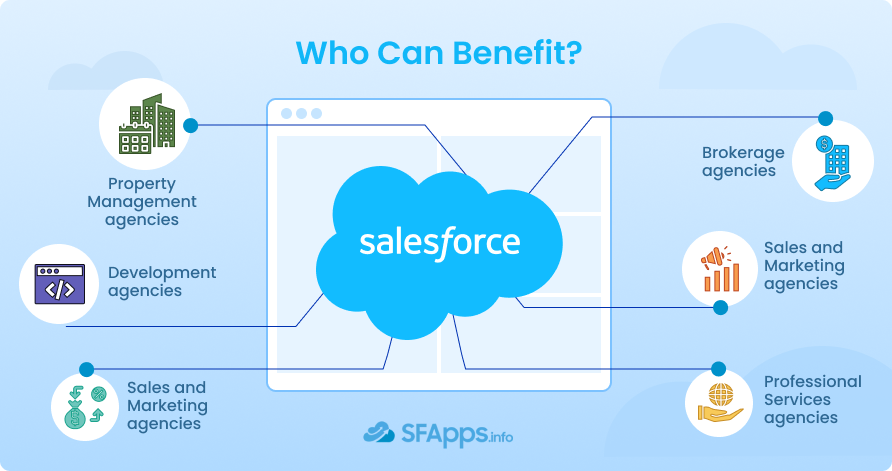
Salesforce is not a one-size-fits-all solution; it’s a versatile platform that caters to a broad spectrum of real estate professionals. Whether you’re running a boutique agency, a large brokerage firm, or specialize in property management, Salesforce CRM real estate has the tools and features to support your business needs. Here’s how different types of real estate agencies can leverage Salesforce for growth and efficiency:
Development agencies benefits:
- Project Management: Enables developers to monitor progress across multiple projects, from initial planning to completion, ensuring deadlines are met and budgets are adhered to.
- Customer Relations: Engages potential buyers and tenants through targeted communications, keeping them informed and interested throughout the development process.
- Market Analytics: Provides developers with insights into market trends, demand forecasts, and competitive analysis, helping to make data-driven decisions about project scope and positioning.
Sales and Marketing agencies benefits:
- Lead Management: Automates the capture and follow-up of leads from various channels, ensuring no potential sale falls through the cracks.
- Targeted Campaigns: Allows for the creation of personalized marketing campaigns based on detailed customer profiles and behavior, increasing conversion rates.
- Sales Efficiency: Streamlines the sales funnel with tools that help sales teams quickly move leads through to closing, enhancing customer experience and maximizing revenue.
Brokerage agencies benefits:
- Listing Management: Salesforce for real estate brokers offers a centralized platform to manage all property listings, making it easier to update and share information across channels.
- Client Tracking: Keeps detailed records of client interactions, preferences, and feedback, enabling salesforce for real estate agents to provide personalized service and recommendations.
- Transaction Workflow: Simplifies the transaction process with automated workflows, ensuring all parties are informed and engaged at each step, from offer to closing.
Property Management agencies benefits:
- Tenant Acquisition: Streamlines the tenant onboarding process, from Salesforce real estate application to lease signing, reducing vacancies and improving tenant quality.
- Maintenance Coordination: Facilitates efficient scheduling and tracking of maintenance and repair work, ensuring properties remain in top condition.
- Rent Collection: Automates billing and collection processes, reducing administrative overhead and improving cash flow management.
Real Estate Lending agencies benefits:
- Customer Relationship Management: Helps lenders maintain a 360-degree view of their customers, from initial inquiry through ongoing loan servicing, enhancing customer loyalty and retention.
- Loan Origination: Automates the application and approval process, making it faster and more efficient while reducing errors and ensuring compliance.
- Risk Analysis: Utilizes advanced analytics to assess borrower risk, loan performance, and market conditions, allowing lenders to make informed decisions and manage their portfolio risk effectively.
Professional Services agencies benefits:
- Project Collaboration: Enables seamless collaboration between real estate professionals, such as accountants, lawyers, and contractors, ensuring timely and efficient project completion.
- Client Management: Provides tools for managing client relationships, from initial contact through service delivery, ensuring high levels of customer satisfaction.
- Service Delivery: Enhances the delivery of services with project management tools and real-time communication, improving efficiency and client outcomes.
Types of Specialized Salesforce Services for Real Estate
To truly leverage the power of Salesforce in the real estate industry, it’s essential to understand the range of specialized services available. These services are designed to help real estate businesses implement, customize, develop, migrate, and maintain their Salesforce solutions, ensuring optimal performance and alignment with business goals. Key services for Real Estate:
Real Estate Salesforce Implementation Services
Professional implementation services ensure that Salesforce is set up correctly from the start. This includes configuring the platform to meet specific business needs, integrating with existing systems, and ensuring that all necessary features are operational. Implementation experts work closely with real estate agencies to tailor Salesforce to their unique processes, maximizing the efficiency and effectiveness of the CRM from day one.
Real Estate Salesforce Customization Services
Customization services allow real estate businesses to adapt Salesforce to their specific requirements. This can involve modifying the user interface, creating custom fields and objects, developing tailored workflows, and integrating third-party applications. By customizing Salesforce, real estate companies can ensure that the platform aligns perfectly with their operational needs, enhancing usability and productivity.
Salesforce CRM Development for Real Estate
Development services focus on building custom applications and features within Salesforce to address unique business challenges. This can include developing new modules for property management, creating advanced reporting tools, or integrating with other business software. Expert developers can extend Salesforce’s capabilities, providing bespoke solutions that drive better business outcomes.
Real Estate Salesforce Migration Services
Migration services assist businesses in transferring their existing data and processes to Salesforce from other CRM systems or data sources. This involves data mapping, cleansing, and validation to ensure a smooth transition. Migration experts ensure that no critical data is lost and that the new Salesforce environment is set up correctly, allowing real estate businesses to start using the platform with confidence.
Real Estate Support and Maintenance Services
Ongoing support and maintenance services are crucial for keeping Salesforce running smoothly. These services include regular updates, troubleshooting, performance optimization, and user support. By providing continuous support, these services ensure that real estate businesses can rely on their Salesforce solution to operate efficiently and effectively, addressing any issues promptly and maintaining high levels of productivity.
These specialized Salesforce services for real estate ensure that businesses can fully utilize the CRM platform, adapting it to their unique needs and maintaining its optimal performance over time. Whether implementing Salesforce for the first time, customizing it to better fit business processes, developing new functionalities, migrating data, or maintaining the system, these services play a critical role in achieving success in the real estate sector. By partnering with experienced Salesforce service providers, real estate businesses can enhance their operational efficiency, improve client relationships, and drive growth.
Insight:
More details and insights about Professional Services Salesforce Implementation can be found in my latest guide – Salesforce for Professional Services.
By adopting Salesforce, each sector of the real estate industry can enhance efficiency, improve client satisfaction, and drive growth. The platform’s versatility and scalability make it an ideal solution for the diverse needs and challenges of these distinct but interconnected segments.
Which Salesforce Tools Help Real Estate and How?
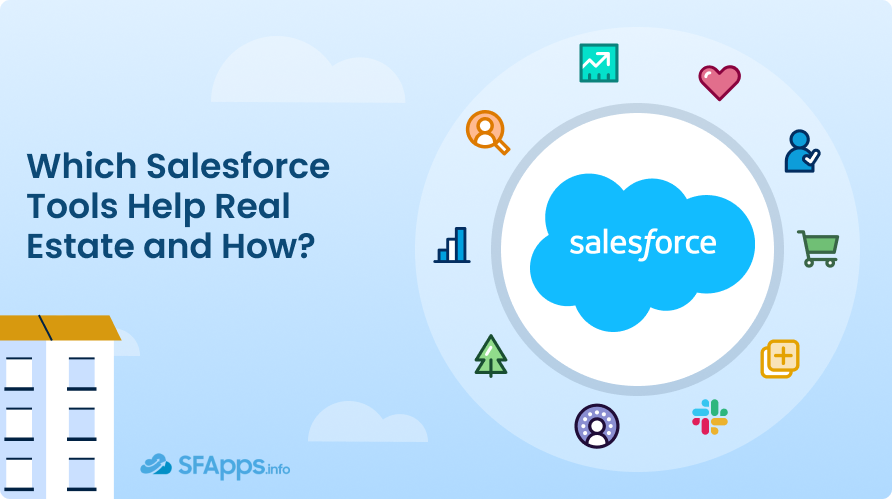
Salesforce, a leading cloud-based CRM platform, offers a suite of features and modules tailor-made for the dynamic needs of the real estate industry. By harnessing these tools, realtors can significantly enhance their operations, from marketing to sales, and customer service to security. Let’s delve into how Salesforce can be your ally in real estate success.
- Marketing benefits with Marketing Cloud: This powerhouse automates your marketing efforts, providing single-tap sharing to social networks, seamless integration with Google Analytics, and other marketing tools. It streamlines lead nurturing, manages your advertising channels efficiently, and helps calculate return on investment (ROI) to optimize your marketing strategies.
- Customer Services, Service Cloud: Enhance your customer service with instant messaging via your website or social media channels, and deploy sophisticated chatbots for handling repetitive inquiries. Offer links to self-service portals, improve referral rates through customer satisfaction, and send automated, personalized communication, elevating the overall client experience.
- Sales, Sales Cloud: Revolutionize your sales process with tools for creating sales documents effortlessly, generating offers with a single click, and capturing new leads through a web-to-lead feature. Track conversion ratios, customize criteria for lead conversion and follow-up, and automate property listings from various sources to streamline your sales operations.
- Analytics and Reporting, CRM Analytics: Gain insights into your business with historical trend analysis, custom report generation, stacked summaries, and detailed snapshots of your leads and sales activities. This module enables informed decision-making based on data-driven insights.
- Purchases, Certinia Procurement: Tailor your Salesforce real estate CRM pricing and discount offers with pre-defined integrations, allowing for custom property pricing based on plot value and features. Streamline booking approvals to enhance the purchasing process for your clients.
- Community and relationships, Community Cloud: Build lasting relationships with clients by improving business processes and providing a seamless platform for real estate agents to connect with customers. This fosters a community of loyal clients and enhances collaboration within the industry.
The potential for customization and automation with Salesforce in the real estate sector is vast, allowing businesses to automate numerous processes. This reduces day-to-day operational overheads, leading to enhanced efficiency and improved client management. Embracing Salesforce’s capabilities can transform how you manage your real estate business, setting a new standard for excellence in client service and operational efficiency.
Cost Analysis for Salesforce Real Estate Implementation
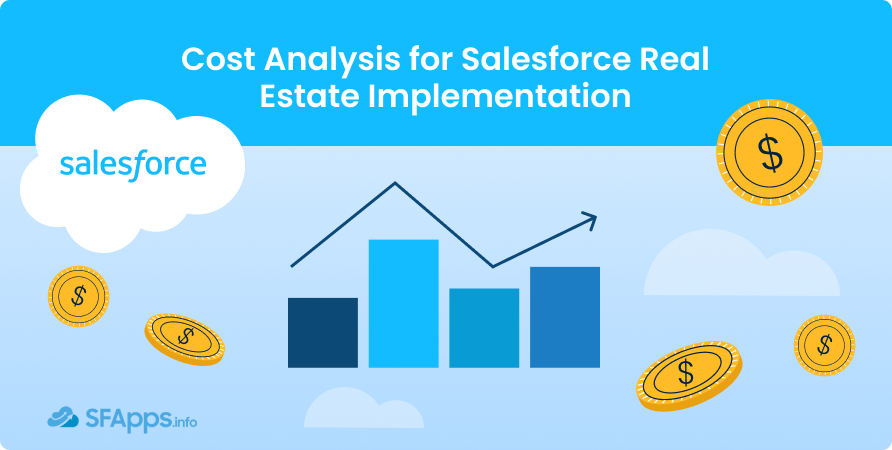
Understanding the financial implications of integrating Salesforce into your real estate operations is crucial. The investment involves various factors, from subscription fees to customization and training expenses. Here’s a more detailed breakdown for cost of most used Salesforce Clouds Licences:
Marketing Cloud Prices:
Marketing Cloud Personalization:
- Cost: Starting at $108,000 Org/Year.
- Benefits for Real Estate: Offers web and email personalization, segmentation, A/B testing, and product/content recommendations. Ideal for real estate firms looking to deliver tailored marketing messages and property recommendations to potential buyers and sellers.
Marketing Cloud Engagement:
- Cost: Starting at $1,250 Org/Month.
- Benefits for Real Estate: Focuses on email marketing, content creation, and robust analytics. Suitable for agencies aiming to enhance their email marketing campaigns with rich content and detailed performance analysis.
Marketing Cloud Account Engagement:
- Cost: Starting at $1,250 USD/Month for up to 10,000 contacts.
- Benefits for Real Estate: Enhances lead nurturing, scoring, and provides engagement history dashboards and campaign reporting.If you are looking how to handle dashboards and reports, more details can be found in the funnel dashboard article. A great tool for real estate businesses to manage leads more effectively and convert them into clients.
Data Cloud for Marketing:
- Cost: $108,000 Org/Year.
- Benefits for Real Estate: Unifies all customer data into a single profile, offering data ingestion, harmonization, and insights. This is particularly beneficial for real estate companies looking to leverage data-driven strategies for targeted marketing and sales efforts.
Marketing Cloud Intelligence:
- Cost: Starting at $3,000 Org/Month.
- Benefits for Real Estate: Provides advanced analytics capabilities with support for up to 10 users and 3 million data rows. Ideal for analyzing marketing performance and optimizing strategies based on actionable insights.
Loyalty Management:
- Cost: Starting at $20,000 Org/Month.
- Benefits for Real Estate: Focuses on member administration, reward management, and includes a license for Tableau CRM for loyalty management. Useful for real estate firms looking to build and manage loyalty programs for repeat clients or referrals.
Service Cloud Prices:
Starter Suite to Unlimited+ Plans:
- Cost Range: $25 to $500 user/month.
- Benefits for Real Estate: From basic case management and customizable reports in the Starter Suite ($25/user/month) to advanced AI for customer service, self-service help centers, and omni-channel case routing in higher-tier plans. In case if you want to create your own Salesforce Einstein Bot, refer to Salesforce Einstein Bots article. These solutions enable real estate businesses to provide exceptional service, manage inquiries efficiently, and automate customer service workflows.
Sales Cloud Prices:
Starter Suite to Unlimited+ Plans:
- Cost Range: $25 to $500 user/month.
- Benefits for Real Estate: Sales Cloud offers a spectrum of features from simplified setup and lead management in the Starter Suite ($25/user/month) to advanced pipeline management, AI insights, and comprehensive sales engagement tools in the Unlimited plans. These tools are essential for real estate agencies looking to streamline their sales processes, improve lead management, and enhance customer engagement through data-driven insights.
The diverse range of Salesforce Cloud solutions, with varying costs and features, provides real estate businesses with the flexibility to choose the tools that best fit their specific needs and budget. The average implementation cost will vary depending on the mix of products chosen, the scale of customization, and the level of support required. Real estate firms should consider these factors carefully to select the Salesforce solutions that will offer the most value for their operations, client engagement, and sales strategies.
Customization and Implementation Costs
The flexibility of Salesforce means it can be tailored to fit the unique processes of your real estate business. However, this customization can add to the initial investment:
- Customization: Adapting Salesforce to match your specific workflow, integrate with existing systems, or develop new functionalities can vary in cost depending on the complexity of the requirements.
- Implementation Partners: Partnering with experienced consultants for implementation can significantly influence the cost, based on the expertise and the level of service provided.
Training and Empowerment
A key factor in maximizing the ROI from Salesforce is ensuring that your Salesforce real estate team is proficient in using Salesforce for real estate. Investment in training is essential:
- Training Programs: Salesforce offers various training options through its Trailhead platform, providing resources for users to learn at their own pace. The cost of formal training sessions can vary, depending on the provider and the depth of the training required.
Ongoing Support and Maintenance
After the initial setup, consider the costs associated with ongoing support, updates, and further customization. Keeping your Salesforce environment aligned with your business needs is crucial for long-term success.
Evaluating the Investment
The costs associated with Salesforce implementation in real estate are an investment in your business’s future. The platform’s ability to streamline operations, enhance customer relationships, and provide actionable insights can lead to significant returns in the form of increased efficiency, higher sales conversions, and improved customer satisfaction.
The decision to implement Salesforce should be weighed against these potential benefits, ensuring that the investment aligns with your business objectives and growth strategy.
Steps to Implement Salesforce in Real Estate
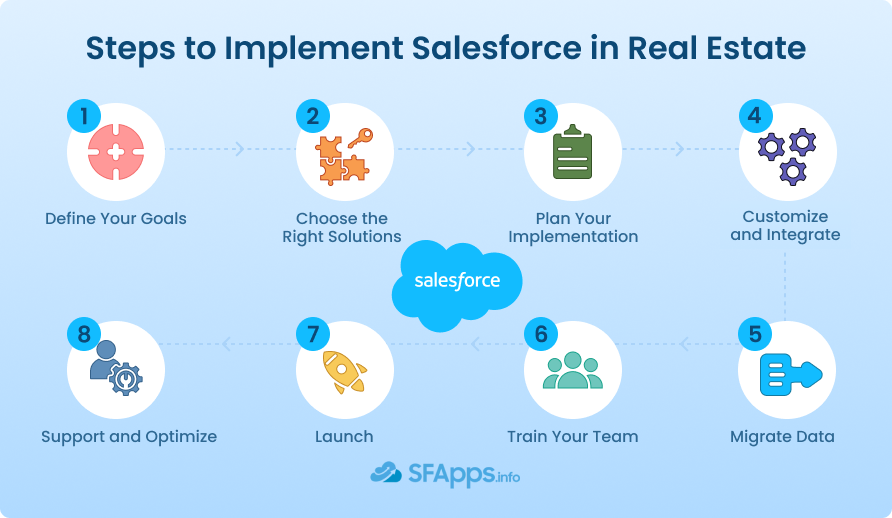
Implementing Salesforce in real estate involves several steps to ensure that the platform aligns with your business processes and enhances your operations effectively. Here’s a streamlined approach to get started with Salesforce in the real estate sector:
Define Your Goals
- Identify Needs: Pinpoint challenges and opportunities in your business where Salesforce can make a difference.
- Set Clear Objectives: What do you aim to achieve with Salesforce? More efficient lead management? Better customer service? Outline your goals.
Choose the Right Solutions
- Select Salesforce Cloud solutions that align with your identified needs. Sales Cloud could be a starting point for CRM, with additional solutions like Marketing Cloud or Service Cloud added based on your requirements.
Plan Your Implementation
- Assemble a Project Team: Include members from sales, marketing, service, and IT.
- Engage an Implementation Partner: Consider the expertise of a Salesforce-certified consultant for guidance tailored to your needs.
Customize and Integrate
- Organize Data: Decide how to structure customer information, properties, and transactions within Salesforce.
- Automate Workflows: Implement automation for tasks such as lead routing and service requests.
- System Integration: Ensure Salesforce works seamlessly with your existing software, like email platforms or property management systems.
Migrate Data
- Prepare Data: Clean and organize your data before transferring it to Salesforce.
- Migration: Use Salesforce tools or an implementation partner to move your data into the new system.
Train Your Team
- Develop Training Programs: Tailor training to different roles, utilizing resources like Trailhead.
- Manage Change: Support your team through the transition with a focus on communication and engagement.
Launch
- Pilot Test: Start with a pilot group to refine your setup based on feedback.
- Go Live: Roll out Salesforce across your organization, providing ongoing support to address any issues.
Support and Optimize
- Provide User Support: Set up a help system for users to get assistance.
- Continuously Improve: Regularly review and adjust your Salesforce configuration to ensure it meets your evolving business needs.
By following these steps, real estate businesses can leverage Salesforce to not only enhance their operational efficiency but also provide a more personalized and engaging customer experience. Salesforce’s scalability means it can grow with your business, adapting to new challenges and opportunities in the real estate market.
Navigating Implementation Challenges: Best Practices for Real Estate
Implementing Salesforce, while transformative, can encounter various issues. Understanding these challenges and preparing for them ensures a more seamless transition. Here are common issues and strategies to overcome them:
User Adoption
- Challenge: Resistance to change and a lack of familiarity with new systems can hinder user adoption.
- Solution: Foster a culture of change through comprehensive training, ongoing support, and involving users early in the implementation process to ensure buy-in and comfort with the new system.
Data Migration
- Challenge: Transferring existing data into Salesforce can be complex, risking data loss or integrity issues.
- Solution: Conduct thorough data cleansing and preparation before migration. Utilize Salesforce’s data migration tools or seek assistance from a Salesforce partner to ensure a smooth transfer.
Customization Overload
- Challenge: Over-customizing Salesforce can lead to increased complexity, making the system difficult to manage and update.
- Solution: Prioritize essential customizations that align with your business processes and keep the system as close to out-of-the-box as practical. Regularly review customizations to ensure they remain relevant and beneficial.
Integration with Other Systems
- Challenge: Integrating Salesforce with existing real estate software or platforms can be technically challenging.
- Solution: Clearly define integration requirements and use Salesforce’s extensive APIs and middleware solutions. Consider engaging with a Salesforce integration specialist for complex scenarios.
Keeping Up with Updates
- Challenge: Salesforce’s frequent updates can disrupt customized solutions or workflows if not properly managed.
- Solution: Stay informed about upcoming updates and test them in a sandbox environment. Plan for regular review sessions to adjust any customizations or workflows as needed.
Best Practices for a Successful Salesforce Implementation
- Start Small and Scale: Begin with a core Salesforce solution and expand as your team becomes more comfortable and your needs evolve.
- Engage Stakeholders: Involve key stakeholders from each department in the planning and implementation process to ensure the solution meets a wide range of needs.
- Focus on Training and Support: Invest in training and provide continuous support to encourage user adoption and ensure your team can leverage Salesforce’s full capabilities.
- Monitor and Optimize: Regularly review system performance, user feedback, and business outcomes to identify areas for improvement.
Adopting Salesforce is about more than upgrading technology—it’s a step towards operational excellence and enhanced client service in real estate.
Enhancing Real Estate with Salesforce Apps and Integrations
Salesforce offers an array of specialized apps and integrations that cater specifically to the real estate industry, driving efficiencies and innovation. Here’s how these tools can transform your operations:
Essential Salesforce Apps for Real Estate
Propertybase Real Estate Platform
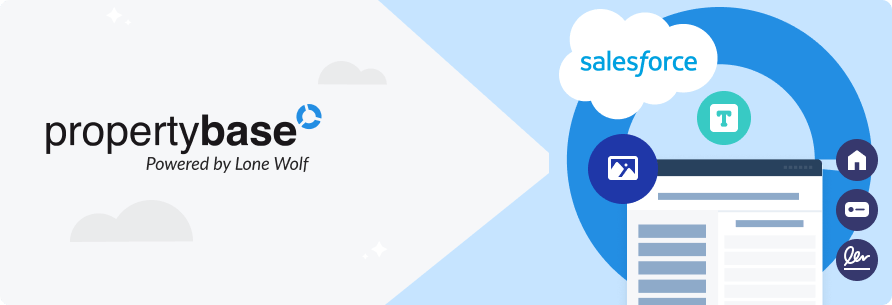
Propertybase is the top real estate platform worldwide, designed to help brokerages and teams achieve lasting growth, build stronger client relationships, and enable agents to close deals faster. It provides a comprehensive set of tools to simplify processes, improve client interaction, and increase deal efficiency, making it a vital resource for Salesforce real estate management professionals aiming to stand out in a competitive industry.
BReal Estate
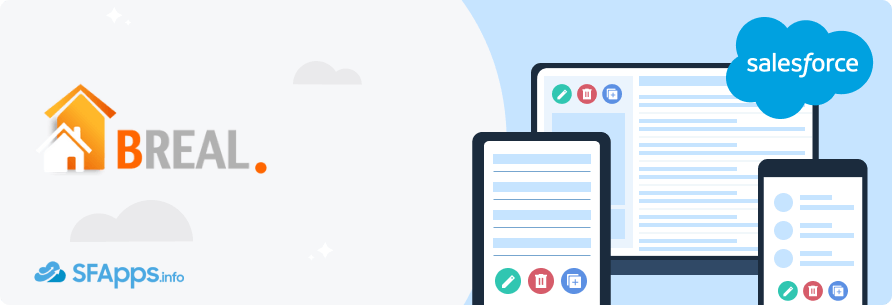
BReal provides a comprehensive software package tailored for property management, catering specifically to the needs of estate agents, shopping mall operators, property managers, investors, and large companies with significant tenant operations. salesforce for real estate investors facilitates efficient management of properties, from leasing and sales to maintenance and tenant relations, across various real estate sectors.
GoMeddo

GoMeddo (previously known as Booker25) provides scheduling, planning, and booking capabilities tailored for various scheduling scenarios. This native Salesforce Cloud solution allows for effortless organization of multi-dimensional bookings or reservations, integrating people, rooms, appointments, and assets seamlessly.
RealE 360
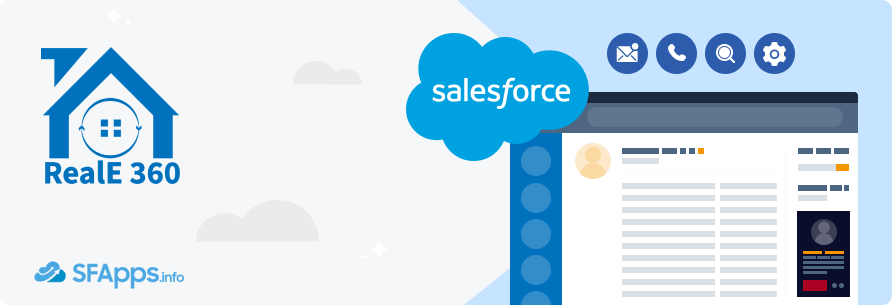
RealE 360, developed on the world’s leading CRM platform, offers the perfect solution for businesses of all sizes, particularly for realtors looking to streamline processes such as prospecting, nurturing, marketing, and payments for both commercial and residential properties.
Zillow
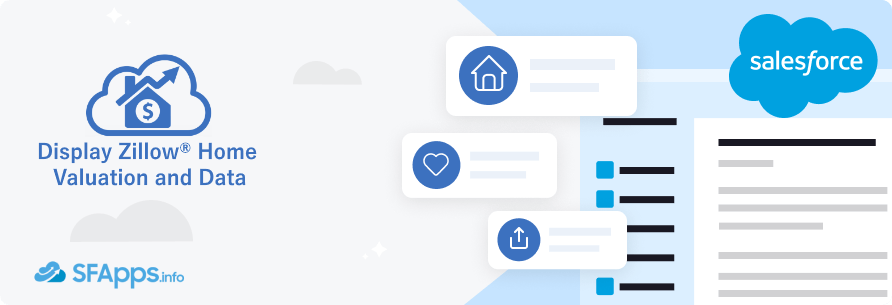
Zillow provides immediate access to detailed information on homes and properties, enabling you to swiftly evaluate their potential for appreciation and fit for specific clients. You can effortlessly share this data with customers or incorporate it into your Salesforce leads, accounts, or contact pages.
Key Salesforce Integrations for Property Management
- MLS Integration: Connecting Salesforce with Multiple Listing Services (MLS) databases ensures agents have real-time access to property listings and data, directly within their CRM.
- Marketing Automation Tools: Integrations with platforms like Mailchimp or Pardot support targeted email campaigns and lead nurturing tailored to client interests and behaviors.
- Document Management Systems: Integrating Salesforce with tools like DocuSign streamlines the paperwork process, making it faster and more secure to close deals.
Adding Salesforce CRM software for real estate and integrations to your real estate operations can greatly boost your efficiency, improve how you engage with clients, and enhance how you manage data. By choosing the right tools that match your business objectives and address your clients’ needs, you can develop a tailored CRM system that propels your business forward. It’s important to remember that the true value of Salesforce lies not only in the technology but also in how you apply it to address the specific needs and seize the opportunities within the real estate sector.
Success Stories: Salesforce Transforming Real Estate
The adoption of Salesforce in the real estate industry has led to numerous success stories, highlighting the platform’s versatility and impact. Here are real life examples of how real estate companies have successfully implemented Salesforce to drive innovation and efficiency:
ERA Belgium
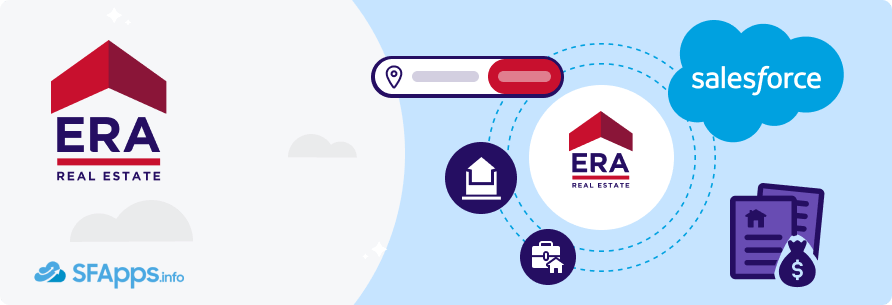
ERA Belgium, with a strong foundation in technological innovation, stands for Electronic Realty Association. Originating from ERA Franchise Systems, the company was a pioneer in using fax machines for real estate sales to American clients in 1972, well ahead of the fax machine’s peak popularity in the 1980s. By the time ERA Belgium was established in 1995, it quickly embraced the growing internet to launch one of the country’s first online property listings portals.
Today, ERA leverages Salesforce Customer 360 for its real estate portal, which supports thousands of customers and over 70 independent franchisees in its network. This system links renters and buyers to around 10,000 commercial and residential properties offered by its franchisees.
Common
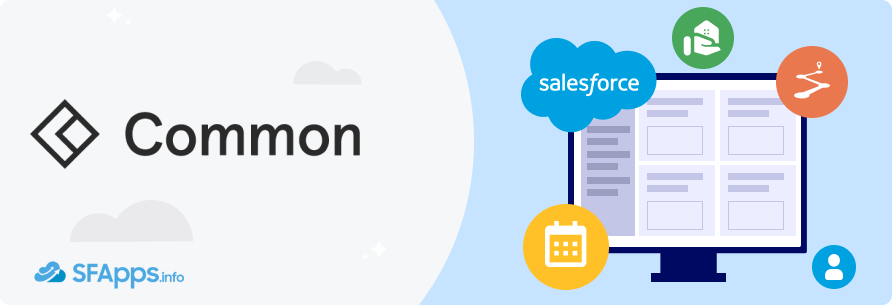
Established in 2015, Common is a residential company that specializes in creating and managing co-living apartments. Based in New York City, Common has expanded to seven cities and anticipates doubling its portfolio from 40 properties by the end of 2020.
With Salesforce, Common simplifies urban living, resulting in scheduling 20 times more property tours.
Zillow
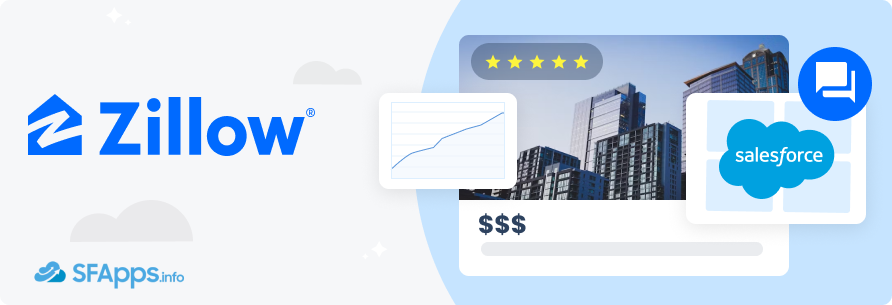
Zillow, leveraging Salesforce, transforms the process of buying houses into creating homes, doubling the number of sales calls made each day.
Since its inception in 2006, Zillow has become the top platform for real estate and rentals, changing the industry by making information such as home value estimates and property listings freely accessible online for the first time.
These success stories highlight how Salesforce can revolutionize the real estate industry. By enhancing client relations, optimizing operations, and using AI to boost sales, Salesforce offers the resources and adaptability needed to meet the specific demands of real estate. Each example emphasizes the need for a strategic Salesforce setup, concentrating on tailored solutions that match business goals and operational requirements. As shown, Salesforce enables real estate companies to not just manage today’s market challenges but also to innovate and set trends for the future.
Frequently Asked Questions: Salesforce in Real Estate
How does Salesforce specifically benefit real estate businesses?
Salesforce streamlines operations, enhances customer relationships, and provides actionable insights through data analytics. It offers tailored solutions for managing listings, automating marketing efforts, and improving client engagement, ultimately leading to increased sales and efficiency.
Can Salesforce integrate with existing real estate software?
Yes, Salesforce boasts a robust set of APIs and a comprehensive ecosystem of apps through its AppExchange, allowing for seamless integration with a wide range of real estate software and platforms, including MLS systems, marketing tools, and document management systems.
Is Salesforce suitable for all sizes of real estate businesses?
Absolutely. Salesforce offers scalable solutions that cater to businesses of all sizes, from individual agents and small agencies to large brokerages and property management firms. The platform’s flexibility ensures that companies can start with basic features and add more advanced tools as they grow.
What is the average time frame for implementing Salesforce in a real estate business?
The implementation time can vary significantly depending on the scale of the project, the complexity of customizations, and the readiness of the business for change. On average, small to medium implementations might take 3-6 months, while larger, more complex projects could take a year or more.
How does Salesforce handle data security, especially with sensitive client information?
Salesforce is built on a foundation of robust security protocols, ensuring that data is encrypted, securely stored, and managed according to global compliance standards. Real estate businesses can configure security settings to control access and protect client information effectively.
What kind of support can businesses expect after implementing Salesforce?
Salesforce provides comprehensive support through its online help portal, community forums, and customer support services. Additionally, businesses can opt for various levels of support plans for more personalized assistance, including access to dedicated success managers and 24/7 support.
How cost-effective is Salesforce for real estate companies?
While the initial investment in Salesforce might seem substantial, the ROI, measured in improved efficiency, higher sales conversions, and enhanced client satisfaction, often justifies the cost. Businesses should evaluate their specific needs and potential benefits to determine the cost-effectiveness of Salesforce for their operations.
Final Thoughts
Salesforce commercial real estate CRM is more than a CRM; it’s a digital transformation engine for the real estate industry. It equips businesses with the tools to streamline workflows, deepen client relationships, and stay agile in a dynamic market. By choosing Salesforce, you’re not just adopting new software; you’re investing in a future where your real estate business leads with efficiency and innovation.
As you move forward with Salesforce, remember that the journey is as important as the destination. It’s about leveraging technology to serve your clients better, enhance your operations, and achieve lasting success. With Salesforce commercial real estate as your partner, the future of your real estate business looks brighter than ever.

Dorian is a 6X Certified Salesforce Developer and Administrator with a start in the IT world as a CRM Admin in 2020. Since diving into Salesforce in 2021 via Trailhead and Focus on Force, he has achieved a Ranger Rank, earned several Superbadges, and bagged certifications including the Salesforce Certified Administrator, Platform App Builder, Associate and Platform Developer I by 2023. In 2024 he also became Salesforce Certified AI Associate and earned Certified AI Specialist Certification in 2025. Dorian is very keen on continuous learning, always looks for fresh ways to improve his knowledge. He enjoys running, boxing, kickboxing and reading diverse kinds of books in his free time.


 Previous Post
Previous Post Next Post
Next Post
a user in his/her mind that how a user can know it.
So that’s why this paragraph is perfect. Thanks!